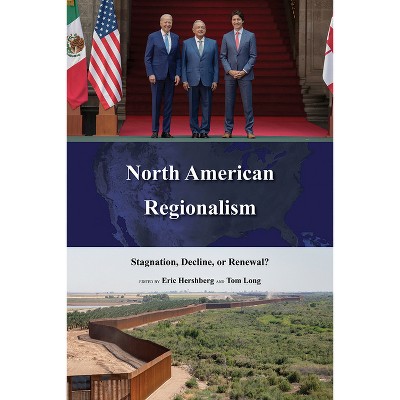Embracing Autonomy - (The Americas in the World) by Gregory Weeks

About this item
Highlights
- Gregory Weeks's Embracing Autonomy departs from other general treatments of Latin American-US relations not by putting US policy aside but by bringing in the Latin American and global contexts more closely and thus avoiding the incomplete picture provided by a narrow focus solely on the policies of the United States.The core of autonomy for Latin America from the United States is seen in new, deeper, and more numerous relationships that do not include the United States.
- Author(s): Gregory Weeks
- 200 Pages
- History, Modern
- Series Name: The Americas in the World
Description
About the Book
Gregory Weeks's Embracing Autonomy departs from other general treatments of Latin American-US relations not by putting US policy aside but by bringing in the Latin American and global contexts more closely and thus avoiding the incomplete picture provided by a narrow focus solely on the policies of the United States. The core of autonomy for Latin America from the United States is seen in new, deeper, and more numerous relationships that do not include the United States. The book is not a study of rebellion against the United States, or even a critique of US policy. Instead, it is an examination of the major shifts that have taken place in the region in recent decades and how they have shaped Latin American-US relations. Weeks's book provides a clearer understanding of where Latin America stands vis-áa-vis the United States in the early twenty-first century. In doing so, we gain a better sense of the trajectory of Latin American-US relations and how they develop in turbulent times.Book Synopsis
Gregory Weeks's Embracing Autonomy departs from other general treatments of Latin American-US relations not by putting US policy aside but by bringing in the Latin American and global contexts more closely and thus avoiding the incomplete picture provided by a narrow focus solely on the policies of the United States.
The core of autonomy for Latin America from the United States is seen in new, deeper, and more numerous relationships that do not include the United States. The book is not a study of rebellion against the United States, or even a critique of US policy. Instead, it is an examination of the major shifts that have taken place in the region in recent decades and how they have shaped Latin American-US relations.
Weeks's book provides a clearer understanding of where Latin America stands vis-à-vis the United States in the early twenty-first century. In doing so, we gain a better sense of the trajectory of Latin American-US relations and how they develop in turbulent times.
Review Quotes
"Gregory Weeks has produced a one-of-a-kind study of twenty-first-century Latin American relations with the United States that emphasizes the region's exciting but dizzying struggle for autonomy vis-à-vis its northern neighbor--and the world. Crisp writing and up-to-date scholarship make this a must-read for students, scholars, and practitioners."--Alan L. McPherson, author of A Short History of U.S. Interventions in Latin America and the Caribbean
"Weeks joins a growing group of scholars recognizing Latin America's powerful agency in inter-American diplomacy. But while Latin American governments hope to widen their room for maneuver or 'autonomy' . . . few have sought to outright reject the United States. The costs of striving for 'radical autonomy' are prohibitively high, as the United States's treatment of Cuba has demonstrated."--Richard Feinberg, Foreign Affairs











